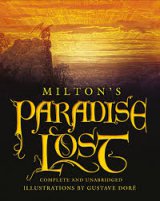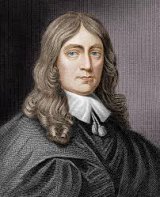Paradise Lost Page #16
Paradise Lost is an epic poem in blank verse by the 17th-century English poet John Milton. The first version, published in 1667, consisted of ten books with over ten thousand lines of verse. A second edition followed in 1674, arranged into twelve books with minor revisions throughout and a note on the versification.
Uriel, for thou of those seav’n Spirits that stand In sight of God’s high Throne, gloriously bright, The first art wont his great authentic will Interpreter through highest Heav’n to bring, Where all his Sons thy Embassie attend; And here art likeliest by supream decree Like honour to obtain, and as his Eye To visit oft this new Creation round; Unspeakable desire to see, and know All these his wondrous works, but chiefly Man, His chief delight and favour, him for whom All these his works so wondrous he ordaind, Hath brought me from the Quires of Cherubim Alone thus wandring. Brightest Seraph tell In which of all these shining Orbes hath Man His fixed seat, or fixed seat hath none, But all these shining Orbes his choice to dwell; That I may find him, and with secret gaze, Or open admiration him behold On whom the great Creator hath bestowd Worlds, and on whom hath all these graces powrd; That both in him and all things, as is meet, The Universal Maker we may praise; Who justly hath drivn out his Rebell Foes To deepest Hell, and to repair that loss Created this new happie Race of Men To serve him better: wise are all his wayes. So spake the false dissembler unperceivd; For neither Man nor Angel can discern Hypocrisie, the only evil that walks Invisible, except to God alone, By his permissive will, through Heav’n and Earth: And oft though wisdom wake, suspicion sleeps At wisdoms Gate, and to simplicitie Resigns her charge, while goodness thinks no ill Where no ill seems: Which now for once beguil’d Uriel, though Regent of the Sun, and held The sharpest sighted Spirit of all in Heav’n; Who to the fraudulent Impostor foule In his uprightness answer thus returnd. Faire Angel, thy desire which tends to know The works of God, thereby to glorifie The great Work-Maister, leads to no excess That reaches blame, but rather merits praise The more it seems excess, that led thee hither From thy Empyreal Mansion thus alone, To witness with thine eyes what some perhaps Contented with report heare onely in heav’n: For wonderful indeed are all his works, Pleasant to know, and worthiest to be all Had in remembrance alwayes with delight; But what created mind can comprehend Thir number, or the wisdom infinite That brought them forth, but hid thir causes deep. I saw when at his Word the formless Mass, This worlds material mould, came to a heap: Confusion heard his voice, and wilde uproar Stood rul’d, stood vast infinitude confin’d; Till at his second bidding darkness fled, Light shon, and order from disorder sprung: Swift to thir several Quarters hasted then The cumbrous Elements, Earth, Flood, Aire, Fire, And this Ethereal quintessence of Heav’n Flew upward, spirited with various forms, That rowld orbicular, and turnd to Starrs Numberless, as thou seest, and how they move; Each had his place appointed, each his course, The rest in circuit walles this Universe. Look downward on that Globe whose hither side With light from hence, though but reflected, shines; That place is Earth the seat of Man, that light His day, which else as th’ other Hemisphere Night would invade, but there the neighbouring Moon (So call that opposite fair Starr) her aide Timely interposes, and her monthly round Still ending, still renewing, through mid Heav’n; With borrowd light her countenance triform Hence fills and empties to enlighten th’ Earth, And in her pale dominion checks the night. That spot to which I point is Paradise, Adams abode, those loftie shades his Bowre. Thy way thou canst not miss, me mine requires. Thus said, he turnd, and Satan bowing low, As to superior Spirits is wont in Heaven, Where honour due and reverence none neglects, Took leave, and toward the coast of Earth beneath, Down from th’ Ecliptic, sped with hop’d success, Throws his steep flight with many an Aerie wheele, Nor staid, till on Niphates top he lights.
Translation
Translate and read this book in other languages:
Select another language:
- - Select -
- 简体中文 (Chinese - Simplified)
- 繁體中文 (Chinese - Traditional)
- Español (Spanish)
- Esperanto (Esperanto)
- 日本語 (Japanese)
- Português (Portuguese)
- Deutsch (German)
- العربية (Arabic)
- Français (French)
- Русский (Russian)
- ಕನ್ನಡ (Kannada)
- 한국어 (Korean)
- עברית (Hebrew)
- Gaeilge (Irish)
- Українська (Ukrainian)
- اردو (Urdu)
- Magyar (Hungarian)
- मानक हिन्दी (Hindi)
- Indonesia (Indonesian)
- Italiano (Italian)
- தமிழ் (Tamil)
- Türkçe (Turkish)
- తెలుగు (Telugu)
- ภาษาไทย (Thai)
- Tiếng Việt (Vietnamese)
- Čeština (Czech)
- Polski (Polish)
- Bahasa Indonesia (Indonesian)
- Românește (Romanian)
- Nederlands (Dutch)
- Ελληνικά (Greek)
- Latinum (Latin)
- Svenska (Swedish)
- Dansk (Danish)
- Suomi (Finnish)
- فارسی (Persian)
- ייִדיש (Yiddish)
- հայերեն (Armenian)
- Norsk (Norwegian)
- English (English)
Citation
Use the citation below to add this book to your bibliography:
Style:MLAChicagoAPA
"Paradise Lost Books." Literature.com. STANDS4 LLC, 2024. Web. 23 Nov. 2024. <https://www.literature.com/book/paradise_lost_101>.




Discuss this Paradise Lost book with the community:
Report Comment
We're doing our best to make sure our content is useful, accurate and safe.
If by any chance you spot an inappropriate comment while navigating through our website please use this form to let us know, and we'll take care of it shortly.
Attachment
You need to be logged in to favorite.
Log In